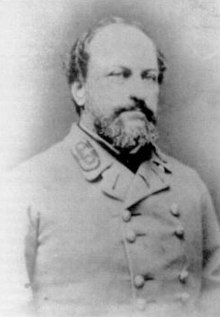Alexander R. Lawton
| Alexander Robert Lawton | |
|---|---|
 |
|
| Born |
November 4, 1818 Beaufort County, South Carolina |
| Died | July 2, 1896 (aged 77) Clifton Springs, New York |
| Allegiance |
|
| Service/branch |
|
| Years of service | 1839–1841 (USA) 1861–1865 (CSA) |
| Rank |
|
| Commands held | Quartermaster-General of the CSA |
| Battles/wars | |
Alexander Robert Lawton (November 4, 1818 – July 2, 1896) was a lawyer, politician, diplomat, and brigadier general in the Confederate States Army during the American Civil War.
Lawton was born in the Beaufort District of South Carolina. He was the son of Alexander James Lawton and Martha Mosse. He graduated from the United States Military Academy in 1839, placing 13th out of 31 in his class. He served as a second lieutenant in the 1st U.S. Artillery until resigning his commission in 1840 to study law. He attended the Harvard Law School, graduating in 1842. He settled in Savannah, Georgia, and entered the fields of law, railroad administration and state politics.
Lawton favored Georgia's secession and became colonel of the 1st Georgia Volunteers. He commanded the Savannah troops that seized Fort Pulaski, the first conflict of the war in Georgia. He was commissioned a brigadier general in the Confederate Army on April 13, 1861, and commanded the forces guarding Georgia's seacoast before being reassigned to Virginia. He led his brigade effectively during Stonewall Jackson's Shenandoah Valley Campaign, the Seven Days Battles, and the Second Battle of Bull Run (Second Manassas). His last field service was at the Battle of Antietam (Sharpsburg), where he commanded the division of the wounded Maj. Gen. Richard S. Ewell. Lawton was seriously wounded early in the morning of September 17, 1862, while defending his portion of the Army of Northern Virginia's line. Initially carried from the field to a temporary hospital, he spent months at home recuperating.
...
Wikipedia
